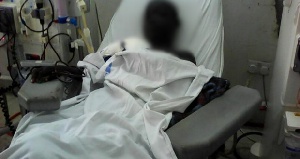 File photo of a dialysis patient
File photo of a dialysis patient
Chronic kidney disease (CKD) has been on the rise in Ghana and has been observed to affect people of all ages. The leading causes of CKD in the country include chronic glomerulonephritis, diabetes mellitus, and hypertension. The first Ghana renal registry published in 2021 showed that the median age of patients on Kidney Replacement Therapy (KRT) was 45 years.
This statistic shows that patients in Ghana present with kidney failure at a relatively young age, and the majority present with end-stage disease. More than three-quarters of these patients have stage 3 or 4 CKD, and in-hospital mortality rates of up to 50% in patients admitted with kidney failure are mainly because they cannot afford KRT.
Renal diseases are among the diseases not included in the NHIS in Ghana, which has made treatment very expensive for those who cannot afford to pay for the treatment. This has led to many deaths as patients cannot get the proper treatment that they require.
This burden was, however, sought to be eased by the National Health Insurance Authority (NHIA) in a statement dated June 1, 2024, when it declared free dialysis for vulnerable groups (patients aged below 18 and above 60) and persons aged 18 to 59 years. This aimed to ease the burden of the cost incurred in managing kidney failure in these groups of people.
Following parliamentary approval, the NHIA disbursed money to six health facilities to offer free dialysis to patients. These include the Komfo Anokye Teaching Hospital, Cape Coast Teaching Hospital, Effia Nkwanta Regional Hospital, Ho Teaching Hospital, Tamale Teaching Hospital, and Korle Bu Teaching Hospital. The initiative is expected to take six months, and the targeted patients are those within the mentioned age brackets.
Although this program is a positive move towards improving the challenges faced by CKD patients, its sustainability is questionable. Some Ghanaians, especially those with CKD, wonder if the program will be sustained beyond the first six months. The government and the NHIA must now consider how this program can be sustained and expanded to cover all CKD patients in Ghana.
The problem of delivering free treatment for CKD in Ghana, especially amongst persons between 18 and 59 years, must be addressed and therefore demands innovative, cost-effective, and sustainable solutions. The government may consider establishing public-private partnerships (PPP) to finance the health sector. The government can thus co-finance and coordinate the provision of dialysis and CKD treatment with private sector stakeholders such as healthcare providers, pharmaceuticals, and insurance companies.
This partnership would assist in sharing the financial load and enhance service provision. For instance, the treatment of CKD could be included under the NHIS, and improved coverage could be provided by supplementing the NHIS with contributions from private insurance companies. Furthermore, through the corporate social responsibility strategy, businesses, especially health and pharmaceutical companies, could be motivated to support the treatment of CKD. To encourage this involvement even more, the government should provide incentives, such as tax exemptions or other privileges, to firms that fund CKD treatment facilities or support patients.
In PPPs, combining resources and experience is possible, a long-term solution that will not burden the government with funding. Another critical measure is improving the role of prevention and early diagnosis initiatives. The The government should take preventive measures to reduce the incidence of CKD, which will reduce the costs of treating the disease in the long run. Screening programs are critical for the early identification of high-risk patients and possibly early intervention to avoid progression to end-stage renal disease (ESRD). Awareness crusades can be conducted across the country to sensitize
people on factors that may lead to the development of CKD, including hypertension and diabetes, among others, and how these risks can be reduced. Furthermore, more CKD screening programs should be implemented in rural and hard-to-reach areas to detect and treat patients with the disease. Including CKD prevention and management in the primary healthcare setting means that every contact with a healthcare facility involves a basic assessment of risk factors for CKD.
In this way, the number of patients with severe CKD will be decreased by prevention and early intervention, and the overall need for dialysis and other costly treatments will be minimized, which will make the program more feasible. Last, the government can help reduce the high dialysis treatment costs by promoting local manufacturing and providing subsidies for dialysis equipment and other consumables. The cost of treatment can be significantly reduced if the country is not so dependent on the importation of these products.
To this end, the government could source for local industries and international investors to set up factories to manufacture dialysis machines, filters, and other relevant equipment in Ghana.
Subsidizing or giving grants to local manufacturers can reduce production costs and dialysis costs for patients. Also, providing training to healthcare professionals on the use of locally manufactured equipment will guarantee quality healthcare services. This means that by establishing a local supply chain for dialysis equipment, the treatment cost can be reduced and thus made available to all patients.
These measures seek to achieve the goal of increasing the availability of CKD treatment while at the same time being cost-effective in a developing country like Ghana.
The government can establish a long-term model of offering free CKD treatment to everyone in need by engaging in partnerships with private entities, embracing preventive care, and local production.